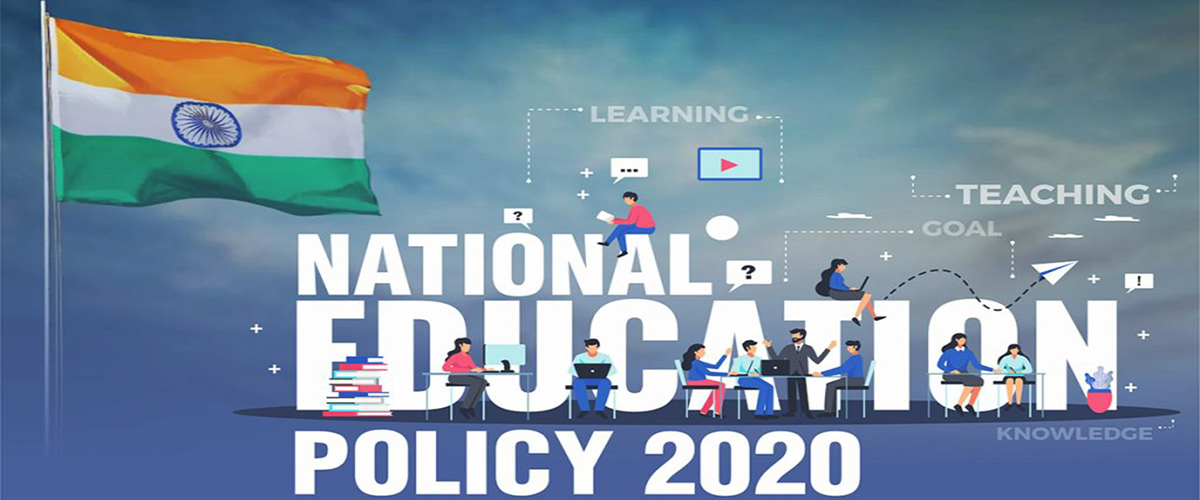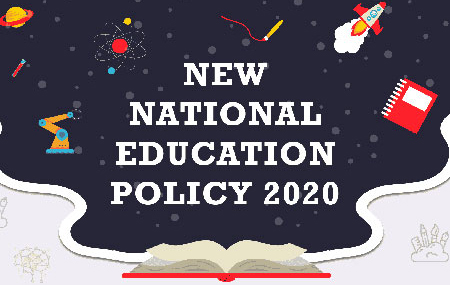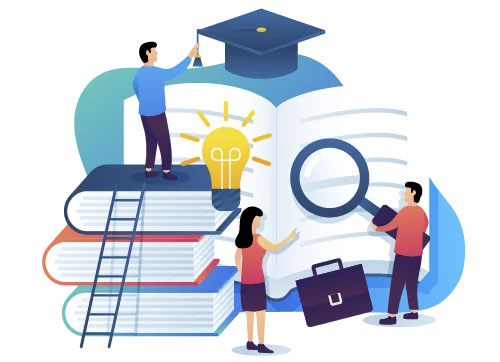Digital Transformation
in Schools: NEP 2020 Perspectives
Get Your Free Trial Now!

Digital Transformation in Schools: NEP 2020 Perspectives
The National Education Policy (NEP) of 2020 has ushered in a brand new era for the training device in India, emphasizing a complete and transformative technique.
One of the important elements of this policy is the combination of virtual technologies inside the schooling sector. A gap analysis is crucial for identifying how these technologies can result in significant adjustments in the way students learn and instructors impart information.
This article explores the views of digital transformation in colleges, as mentioned in the NEP 2020.

Importance of Digital Transformation for NEP 2020 Adoption
 Technological Infrastructure
Technological Infrastructure
The NEP 2020 envisions the advent of robust technological infrastructure in colleges, making sure that each college has the right of entry to the necessary virtual tools and connectivity. This consists of the supply of clever lecture rooms, excessive-speed internet, and other virtual assets. The objective is to bridge the virtual divide and make excellent training handy to students through out city and rural areas.
 Online Learning Platforms
Online Learning Platforms
With the arrival of the virtual age, the NEP acknowledges the importance of gaining knowledge of platforms online to improve learning enjoyment. The policy encourages the development and adoption of digital content material, e-books, and online guides. This shift towards digital structures allows students to access a tremendous array of educational assets beyond their textbooks, fostering an extra dynamic and interactive learning environment.
 Teacher Training and Capacity Building
Teacher Training and Capacity Building
Recognizing the pivotal role of instructors in the implementation of virtual equipment, the NEP emphasizes the need for considerable teacher education packages. Teachers are expected to be talented in using the era to facilitate the effective gaining of knowledge. This consists of training on virtual content advent, digital school rooms, and making use of educational apps. Continuous expert improvement programs are crucial to make sure that instructors stay abreast of today's technological advancements.
 Personalized Learning
Personalized Learning
Digital transformation permits the implementation of personalized getting-to-know procedures. The NEP underscores the significance of catering to the various studying styles and tempos of students. Adaptive getting-to-know systems and academic software programs can be tailor-made to a person's wishes, permitting college students to develop at their own pace and draw close ideas extra thoroughly. This method promotes a deeper expertise of topics and encourages self-directed knowledge.
 Assessment and Evaluation
Assessment and Evaluation
The NEP envisions a shift from conventional examination methods to a greater holistic and continuous evaluation system. Digital tools play a pivotal function in facilitating formative tests and presenting actual-time remarks to both students and teachers. This technique not only reduces the stress associated with examinations but also allows for greater comprehensive expertise of a scholar's average development.
 Global Collaboration
Global Collaboration
Digital transformation in schools opens up avenues for international collaboration and change of information. The NEP encourages schools to interact in international partnerships, collaborative tasks, and virtual interactions with college students and educators from around the arena. This fosters an international perspective and prepares students for the demanding situations of the interconnected international.
What is ( NEP) National Education Policy 2020
The National Education Policy (NEP) 2020 is a landmark report that outlines the imaginative and prescient roadmap for the improvement of schooling in India.
Approved by means of the Union Cabinet on July 29, 2020, the NEP 2020 is a comprehensive reform that aims to transform the country's education device to fulfil the challenges of the 21st century.
This policy replaces the National Policy on Education (NPE) of 1986 and its next modifications.

Role of Digital Transformation in the Adoption of NEP 2020
Digital Infrastructure and Connectivity
One of the vital components of NEP 2020 is the emphasis on leveraging digital generation to enhance the academic revel in. The implementation of virtual tools and systems calls for a robust digital infrastructure and enormous connectivity. Digital transformation is important in constructing and upgrading the essential technological backbone to support online learning, offering college students and educators seamless access to instructional resources.
Online Learning Platforms
NEP 2020 recognizes the significance of online mastering and promotes the combination of eras within the training gadget. Digital transformation facilitates the development and deployment of online mastering systems that offer numerous guides, enabling students to pursue various subjects past the traditional curriculum. These structures additionally offer a flexible knowledge of the environment, permitting college students to study at their tempo and comfort.
Adaptive Learning Technologies
Digital transformation permits the incorporation of adaptive gaining knowledge of technology, which caters to characters getting to know styles and pace. Personalized learning reports, facilitated with the aid of synthetic intelligence (AI) and machine learning algorithms, assist students in grasping standards more successfully. NEP 2020's emphasis on flexibility and desire is more advantageous via virtual gear that adapts to the specific needs and talents of every learner.
Data-driven Decision Making
The NEP 2020 encourages the usage of records for informed decision-making in training. Digital transformation enables the gathering and evaluation of records related to pupil performance, engagement, and learning outcomes. Educational institutions can use this data to pick out regions of improvement, customize coaching methodologies, and enhance universal academic effectiveness.
Teacher Training and Professional Development
NEP 2020 recognizes the want for non-stop professional improvement for instructors to adapt to the converting instructional panorama. Digital transformation performs a critical function in presenting instructors with vital schooling via online workshops, webinars, and collaborative platforms. This ensures that educators are equipped with the competencies to combine era into their coaching practices efficaciously.
Digital Assessment and Evaluation
Digital transformation aids in the evolution of assessment and evaluation methods. NEP 2020 emphasizes a shift from rote memorization to competency-based mastering. Technology allows for progressive assessment strategies, along with actual-time feedback, online examinations, and overall performance analytics. This ensures a more complete assessment of college students' knowledge and alertness of principles.
Advantages of Digital Transformation for National Education Policy 2020 Adoption
Access to Quality Education for All
Digital transformation enables the creation of online structures and e-studying sources, breaking down geographical obstacles and supplying access to quality education for college kids across various backgrounds. This aligns with the NEP 2020's emphasis on making schooling more inclusive and available to all.
Personalized Learning Experiences
Technology enables the implementation of adaptive learning structures and artificial intelligence-pushed academic gear, allowing for personalized getting-to-know experiences. This addresses the NEP 2020's consciousness on catering to men's or women's learning patterns and tempo, fostering an extra student-centric schooling gadget.
Teacher Empowerment and Professional Development
Digital equipment offers teachers sources for non-stop expert improvement, enhancing their pedagogical skills and keeping them abreast of contemporary academic methodologies. This aligns with the NEP 2020's vision of promoting a subculture of continuous mastering for educators.
Efficient Administration and Management
Digital transformation streamlines administrative techniques, making facts management, assessment, and conversation extra green. This assists instructional institutions in adhering to the NEP 2020's suggestions on powerful governance and control practices.
Global Collaboration and Knowledge Exchange
Digital structures enable college students and educators to connect globally, fostering collaboration and understanding of change. This aligns with the NEP 2020's objective of integrating international first-rate practices and selling a greater internationally aggressive schooling device.
Assessment and Evaluation Innovation
Digital transformation permits for the improvement of revolutionary assessment tools, such as online examinations and automated grading systems. This aligns with the NEP 2020's emphasis on comprehensive and non-stop assessment, moving far from rote memorization-primarily based checks.
Enhanced Vocational and Skill-Based Education
Digital technology can assist in the integration of vocational and ability-based education, aligning with the NEP 2020's emphasis on promoting a holistic and multi-disciplinary approach. This prepares students for real global challenges and complements their employability.
Data-Driven Decision Making
Digital transformation generates giant quantities of records that may be analyzed to inform choice-making methods. Educational institutions can use this information to evaluate pupil performance, become aware of regions for development, and make facts-pushed decisions, assisting the NEP 2020's purpose of fostering a tradition of proof-primarily based policymaking.
Innovation in Content Delivery
Digital structures enable the introduction of attractive and interactive content material, improving the getting-to-know experience. This helps the NEP 2020's emphasis on curriculum flexibility and the integration of modern, applicable content to meet the evolving desires of college students.
Flexible Learning Environments
Digital transformation permits the introduction of flexible mastering environments, allowing students to get admission to instructional content anytime, anywhere. This aligns with the NEP 2020's emphasis on flexibility in getting to know schedules, accommodating various student needs, and selling lifelong getting-to-know.
Parental Involvement and Communication
Digital tools facilitate seamless conversation between instructors, college students, and mothers and fathers. Parents can actively take part in their children's education, staying knowledgeable about their progress and attracted to their mastering journey. This strengthens the collaboration among educators, mothers, and fathers, supporting the NEP 2020's aim of relating to all stakeholders in the education process.
Resource Optimization and Cost Efficiency
Digital transformation can result in resource optimization through the green use of the era. Online sources and cloud-based platforms can reduce the want for physical infrastructure, textbooks, and different conventional materials, contributing to value performance. This resonates with the NEP 2020's name for resource sustainability and most advantageous aid usage.
Crisis Resilience and Continuity
The COVID-19 pandemic brought to light how crucial digital education is to maintaining knowledge throughout emergencies. Digital transformation makes training more resilient by presenting opportunity avenues for gaining knowledge, be it through online training, virtual resources, or collaborative platforms. This aligns with the NEP 2020's imagination and prescient of making a strong and adaptable training gadget able to address unexpected challenges.
Promotion of Research and Innovation
Digital equipment provides college students and educators with the right of entry to a sizable pool of statistics, fostering a way of life of research and innovation. This aligns with the NEP 2020's emphasis on promoting a studies-orientated method in better education, preparing students to contribute to current improvements in numerous fields.
NEP 2020: Digital Transformations Required in Schools
Inclusive and Equitable Access
One of the number one dreams of NEP 2020 is to offer inclusive and equitable high-quality schooling. Digital ameliorations play a pivotal role in attaining this goal with the aid of bridging the digital divide. With the enormous availability of smartphones and net connectivity, colleges can leverage virtual gear to make sure that scholars, irrespective of their socio-monetary heritage, have the right to access academic assets. This move closer to inclusivity aligns with the worldwide fashion of leveraging the era to democratize education.
Flexible Learning Environments
NEP 2020 envisions a shift from conventional rote-based total learning to a more flexible and experiential technique. Digital ameliorations permit colleges to create dynamic studying environments that cater to diverse studying styles. Online structures, interactive simulations, and multimedia content empower educators to supply customized and tasty training, fostering deeper information on subjects among college students. The policy advocates for the combination of eras to make studying more fun and relevant, preparing college students for the challenges of the 21st century.
Skill Development and Critical Thinking
Digital tools are instrumental in fostering crucial questioning and ability development among students. NEP 2020 emphasizes the significance of cultivating twenty-first-century skills, which include problem-solving, creativity, and digital literacy. By incorporating the latest technology into the curriculum, schools can facilitate arms-on learning reviews, collaborative tasks, and real-world programs. This no longer complements educational studying but additionally equips college students with realistic abilities that are important for their future careers.
Conclusion

In conclusion, the integration of virtual transformation in schools, as envisioned through the National Education Policy (NEP) 2020, marks a sizeable step closer to fostering a dynamic and inclusive getting-to-know environment.
The NEP 2020 locations a strong emphasis on harnessing technology to enhance the quality of education, sell creativity, and prepare college students for the demanding situations of the digital age. By embracing digital equipment and structures, colleges can destroy conventional limitations to studying, making training extra accessible and tasty for college students from numerous backgrounds.
The NEP 2020 encourages a holistic method of virtual transformation, advocating for the development of digital literacy abilities, the advent of interactive and customized getting-to-know reviews, and the usage of data-pushed insights to enhance academic effects.
FAQs
What is the significant role of Digital Transformation in schools in step with the National Education Policy (NEP) 2020?
The NEP 2020 emphasizes the combination of eras in training to beautify the mastering experience. Explore how digital transformation is estimated to play a pivotal position in shaping the educational landscape consistent with the coverage.
How does NEP 2020 address the virtual divide in schools in the course of the digital transformation technique?
The virtual divide is a problem in many educational systems. Find out how the NEP 2020 addresses problems related to the accessibility of digital tools and technologies, making sure that the blessings of virtual transformation are inclusive and reach all college students.
What are the important components of digital transformation as outlined in NEP 2020 for schools?
Delve into the particular recommendations and tips provided by NEP 2020 concerning the combination of virtual gear, online assets, and e-mastering systems. Understand the key components that schools need to pay attention to throughout their digital transformation journey.
How does NEP 2020 promote instructor training and expert development inside the context of Digital Transformation in schools?
Teachers play a vital function in the hit implementation of virtual gear within the school room. Explore the NEP 2020's perspective on trainer training and professional improvement and how it aims to equip educators with the skills needed for the best and most effective integration of technology.
What challenges and possibilities do schools face in aligning with the Digital Transformation desires of NEP 2020?
Discover the ability hurdles faculties can also come upon while undergoing virtual transformation and the way the NEP 2020 addresses those demanding situations. Additionally, discover the possibilities supplied by using the policy for schools to leverage generation efficiently of their coaching methodologies and administrative techniques.